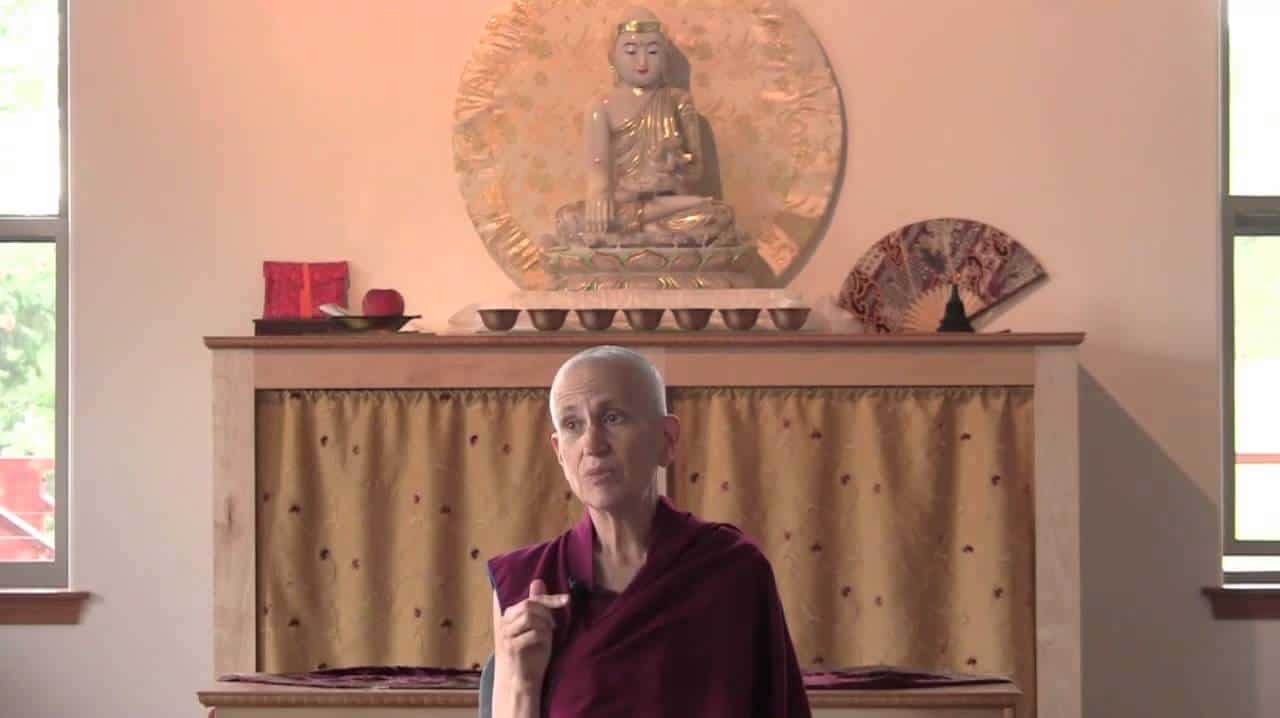Verse 53: The wandering mind
Part of a series of talks on Gems of Wisdom, a poem by the Seventh Dalai Lama.
- Our mind can go off to things present in the environment, or memories of the past and plans for the future
- The internet has made it harder to stay focused, easier to distract the mind
- Breathing meditation is a practice for calming and focusing the mind
Gems of Wisdom: Verse 53 (download)
“What force enters the life channel and disrupts the stability of the mind?”
This one you won’t know. “The force called mental wandering that meanders in purposeless directions.”
What force enters the life channel and disrupts the stability of the mind?
The force called mental wandering that meanders in purposeless directions.
In talking about the force that enters the life channel; here it’s referring to the tantric description whereby we have the central channel in the center of the body in front of the spine. And it’s said that the winds that go in the central channel and also in the other channels that are all throughout the body, that the mind and the wind depend on each other. It’s said that the mind rides on the wind and the wind is like the mount, or the vehicle, of the mind. So if you’re riding on a horse or something if the horse is unstable, like the wind is unstable, then the rider gets unstable, so your mind gets unstable. On the other hand, if the rider is out of balance then it influences the horse and makes the horse out of balance. So either way…. Sometimes, in a physical way, if our winds are out of balance then the mind gets kind of, yes, out of balance. That’s what they usually call lung, or wind disease. But it also goes the other way. When our mind is full of all sorts of wandering thoughts and superstitions—that’s what Lama Yeshe used to call our preconceptions and disturbing emotions—then that really affects the energy in the body, too. Okay?
Here it’s talking about the meandering thoughts, which we all know so very well. Because as I was just saying this morning, I was looking at…. Oh, that light bulb, that one’s on now and this one’s off. Gee I wonder…. And, what’s that jacket doing over there? But it’s really a nice day out today…. What was I talking about? [laughter]
And so our mind just goes off. Sometimes about innocuous things like that. But it also goes off to, you know, fifteen years ago so-and-so said this and that to me…. And tomorrow or next month I’m going to have to see so-and-so and I know we’re going to have this really uncomfortable discussion…. And our mind just goes off on all sorts of things. You know? We see it very clearly when we meditate—unless we’re falling asleep instead—but even when you’re trying to study sometimes that happens, too. Your mind just starts going off to all sorts of different things, and okay, let’s click on this and click on that….
What I’ve noticed is I think this thing of always being online makes the mind more distracted. Because you always have to look to see if you got something. And I don’t even have a smartphone. I mean, I watch people with smartphones and I mean, constantly distracted. They can’t carry on a conversation. And so this really affects the mind and that affects the wind, too, which then affects the mind again, which affects the wind…. So it’s something to be really aware of and cautious about.
When our mind starts to wander notice it immediately, bring it back to what we were doing. If you’re working on a project and your mind starts going “well let’s check this, let’s go here, let’s go…. Time for another cup of tea. Time to pet the cat.” You know? Kind of like, stop and, “Do I really need to do this now? How about if I work until a breaking point and then go up and take a break.” Instead of I’m sitting and then away and sitting and then away…. To keep ourselves focused on something.
That kind of self-discipline and awareness is very helpful in counteracting it. And also doing the breathing meditation, especially at the beginning of your meditation sessions, just to calm the mind a little bit just by focusing on the breath. Watching the breath either at the nostrils and upper lip where you feel the sensation, or watching it here (at the belly) where you’re aware of the rise and fall. Or there’s another way where you’re just aware of the breath entering and leaving your body. But that can be very helpful for calming the mind down. Of course, the mind likes to wander there, too, but the whole idea is to keep bringing it back.
[In response to audience] You missed part of the talk because you were somewhere else. And often when we do our chanting, so easy for the mind to go elsewhere.
[In response to audience] Yes, that’s very true. If you’re looking something up on the internet it’s so easy to get distracted because they’re always giving you *new things* to click on. Most of which are totally boring. But you don’t know until you click.
But you’ve got to, again, stay focused: Okay, I’m online to find this piece of information and that’s it.
Venerable Thubten Chodron
Venerable Chodron emphasizes the practical application of Buddha’s teachings in our daily lives and is especially skilled at explaining them in ways easily understood and practiced by Westerners. She is well known for her warm, humorous, and lucid teachings. She was ordained as a Buddhist nun in 1977 by Kyabje Ling Rinpoche in Dharamsala, India, and in 1986 she received bhikshuni (full) ordination in Taiwan. Read her full bio.


